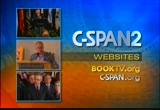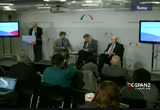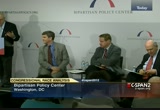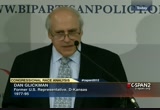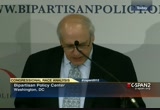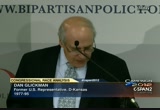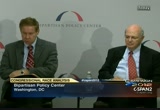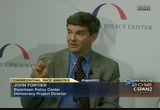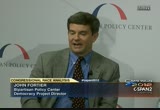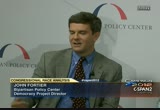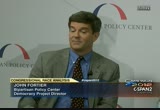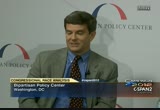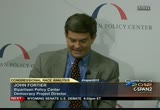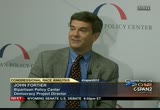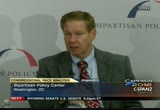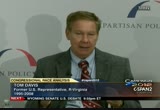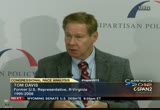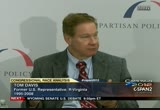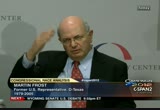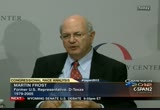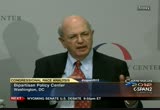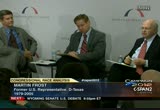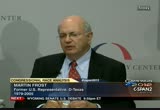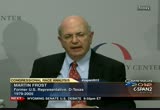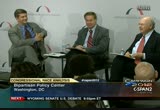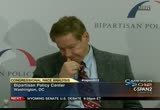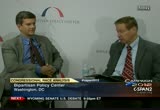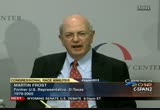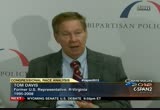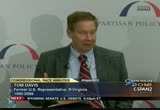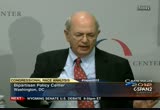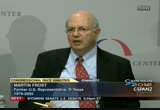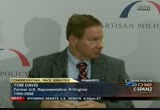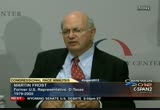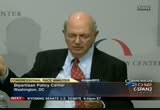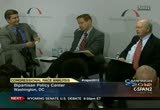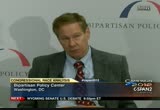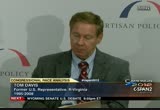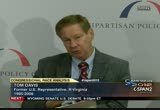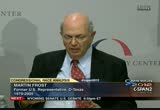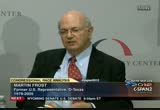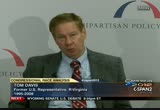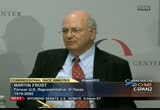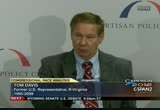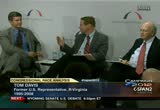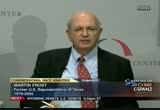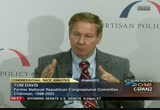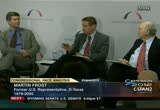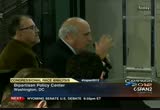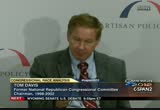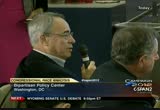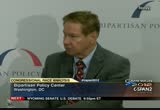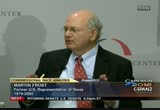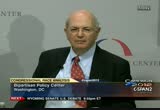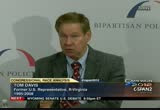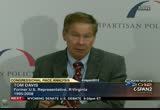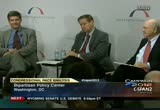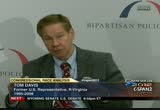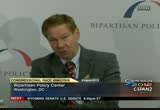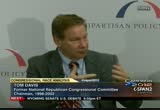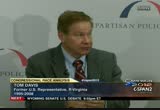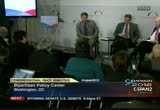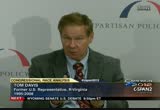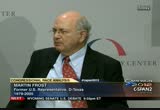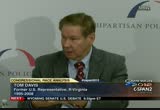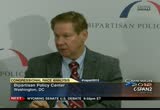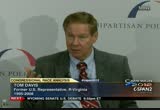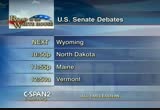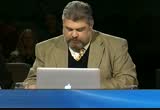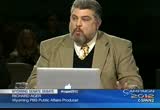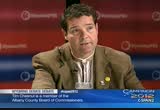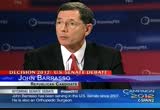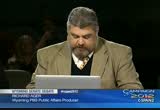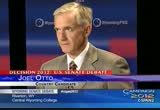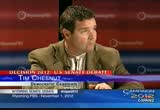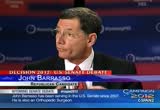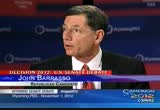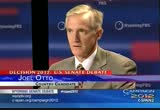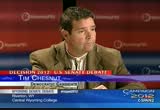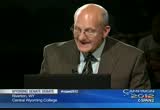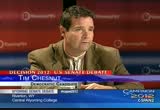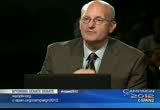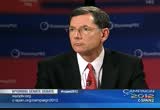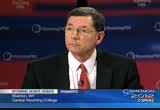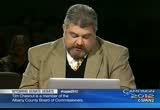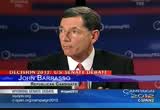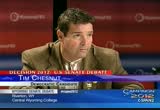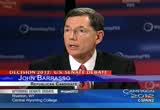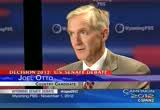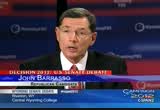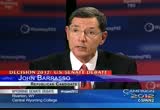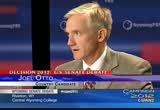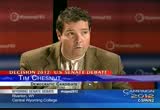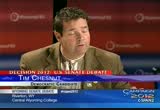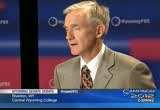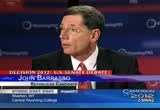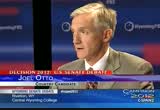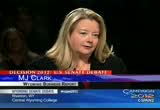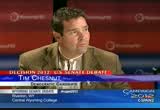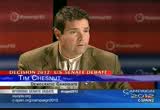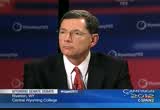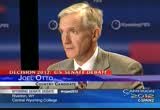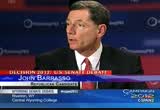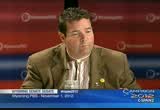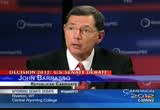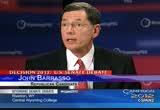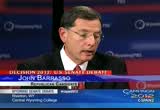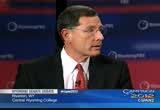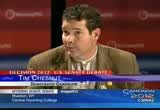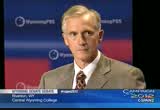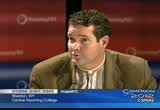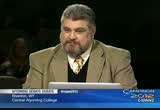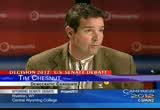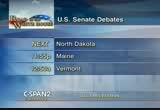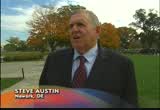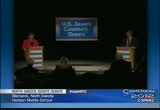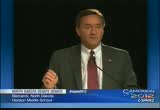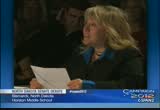tv Tonight From Washington CSPAN November 5, 2012 8:30pm-11:00pm EST
8:30 pm
>> guest: we have certain deadlines that are independent of what you put forth. there are some deadlines and there is critical communications that must be met. decisions that must be made that we will continue to use. we will have a couple of days off and at thanksgiving and will have a couple of days off and maybe one or two off for the new year. but outside of that, the work continues in terms of american needs in this nation. >> host: do you foresee a hearing on sandy and its affect? >> guest: i anticipate -- i'm not sure if it would be necessarily at the federal level. but i know in terms of this -- i'm pretty confident that there will be some assessment.
8:31 pm
normally on a state-by-state level. again, looking at and evaluating and making pronouncements is what we can do better. there will be hearings. i'm not sure if it will escalate to the federal level. >> host: thank you, mignon cyburn and paul kirby. this is the tremont on c-span2. "communicators" on c-span2. ..
8:32 pm
>> on the aid of the 2012 election former u.s. representatives talked about competitive u.s. house and senate races around the country. panels includes former representative former chairs of the republican, democratic national committees. from the bipartisan policy center in washington, this is an hour and 20 minutes.
8:33 pm
[inaudible conversations] [inaudible conversations] >> why don't we go ahead and begin. good morning everybody. i and a senior fellow at the bipartisan policy center and more relevant a former member of congress from the great state of kansas. all of us who are former members think back nostalgically about her last campaign and what it was like and how we relate to these kinds of things personally and i know both tom and martin have great stories to tell and we are fortunate to have too two
8:34 pm
great, effective and insightful and intelligent former members here and john fortier will moderate this panel and talk about the elections. i just want to make a couple of comments, taking the prerogative of the chair since i did serve in the house for 18 years. john fortier and i were on a panel this saturday for foreign diplomats about the american election and most of the campaign discussion was about obama and romney. somebody afterwards asked me, he said, there was no discussion of the congressional races. does it matter in america who was elected to congress and it was like it really hit me. i think the answer is yes. and as a former nine term house member i was troubled by the question but i can understand that because most of the meaty discussion concerns the presidential race. i am convinced the founding
8:35 pm
fathers made a clear statement when they said that the first part of the organization of our government, the article i organization, was congress and in fact day they i think implicitly felt in terms of trying to -- executive authority that it was more important branch of the government at that point in time. not that times have changed but the power the president has changed dramatically but i think it's -- to ignore these races regardless of who is elected president. so we have this amazing election, interesting election on many parts of it and i think the topic occurring one day before the election is particularly relevant particularly as it relates to congress and the election and how elections are operating in how it relates to the presidential election. i have questions that i would ask myself and will turn it over to john for his review. one obviously from the parochial
8:36 pm
perspective is, on the senate side, who will control the senate, what are the races to watch, is it likely that the majority will turn the senate from democrat to republican? the same question is asked about the house. is there a chance that nancy pelosi could replace john boehner as the speaker of the house or for those races pretty much sets. this morning in "politico" and "politico" there was a headline with downs drive to retake the house falter and if that is so, why is that, given all the money and the effort that has been placed on that. the third question is the role of money in this election. is a unique? is a different? how is it different? is that the amount of party money and individually raise money that has been drowned out by outside money, super pacs and the new ways that people have been funding campaigns and what does that mean? the fourth question i would ask is, will there be any moderates
8:37 pm
left or what will be the appetite of those who've are left to work with the president and especially issues like the fiscal cliff, sequestration, taxes, deficits, debt increase and even issues that are somewhat more parochial but also very important like the farm bill which expires. we do not have farm legislation for the first time in many generations. and you know, both the president and governor romney have been rather bipartisan at least in their pitches in the last few days. the question is, after the election, will those pitches go back to kind of the bitterness and the hyperpartisanship or are we in for a period of perhaps, not going to say the glory days of politics but are we in for a period that is more responsible in terms of getting things done so is supposed atmosphere election changing or are we
8:38 pm
facing the same hyperpartisanship we have seen in the last few months? i don't have the answer to all of these questions. i know that their others and others and we have a great moderator. my colleague here, john subfour, who is a skilled political scientist and has been involved in dealing with all of these issues. like to welcome my former colleagues who have done a lot to make this country better place. i turn you over to john. thank you. >> thank you, dan. thank you for all coming. you may know this panel was originally scheduled for last weekend we made a chain so here we are in the eve of election and the one advantaged of that is there is little time before the voting ends and ultimately to be able to make your prediction and blame it on some intervening event between now and the election is not really there. so you're really on the line here. i thought dan was going to make
8:39 pm
introductions but i'm going to make the introductions. the longer version is in your packet. tom davis is representative of northern virginia in congress and was the chairman of the house government reform committee as well as the head of the national republican campaign committee. martin frost represented texas and the ranking member of the rules committee and chair the democratic congress and also on the other side of the aisle the democratic congressional campaign committees of both experienced members but also experienced in running the national races for congress for their prospective parties. i'm going to take a few minutes here at the beginning before return to tom and martin and go ahead and look through a report which we are releasing at bpc. it's about redistricting and the change we have made in our districts following the census and partly about the members who are holding those and we are --
8:40 pm
whether we will expect to see moderate members were more turnover. here are a few highlights and we have some slides. first of all, the number of competitive seats in congress. we are looking basically back at the last four decades and you can see that overall the trend is towards the number of competitive seats is down, just a slight amount from 2000 decade but in the decade ahead we will have slightly fewer seats that are competitive. we will have significantly fewer seats more competitive than they were in their 80s, in the 1970s where we saw almost 150 seats and today we are very post-100. we also look at a second category of seats which is what they called misaligned districts and that is a combination of districts that are, have a composition for one party and they tend to vote for president strongly for one party by a margin that would be more than 55 to 45% or the president of
8:41 pm
one party in the up that district is held by a member of the opposite party. an example, democrat holding a strongly conservative seat in the south goes for a republican. that would be a misaligned district. here we have a history that we have many seats that were of this character not so long ago. if you look back before the 1993 election, there were 93 democrats with that description, 93 democrats and very one republican seat. smaller number of route publicans that won a democratic seat, that number is a little under 10 but still significant numbers of people who are of both parties. who held seats that are against the predilections of their party. now you can look and see what has happened over time. if you look at the 1990s, the numbers in the '90s and the number drops. in 2003 we are down to -- and today we have nine democratic numbers who represent seats that are very republican and we have two republican
8:42 pm
members who represent that are very democratic. one more illustration of this is to show you what the house of representatives looks like in a comparison between 1993 and today. you will see on the left that composition of the districts. the seats right in the middle, 50 to 52% republican, 52% democratic are the ones that are the closest seats in the most competitive seats and as you go further up and down on the chart, the more republican and democratic seats you have a lot of mixing of seats here in 1993, lots of blue, democrats holding republican seats in a number of red, republican holding democratic seats. if you look today, you will see the separation is significant. the number of democrats on the top of the chart, republican seats has gone way down in the number of republican seats are
8:43 pm
almost nonexistent. so we have moved any significant way to realigning our districts. one of the consequences of this, it's often thought that redistricting or commonly thought that redistricting has a large effect on america and the debate in political science is that it's almost nonexistent effect or small to moderate the effect. one effect of having fewer competitive districts, if there are fewer competitive districts, competitive districts tend to produce members that are slightly more moderate than the average republican, slightly more moderate than they average of democrat. they don't produce people who are right in the middle of the spectrum so if you have more competitive districts you are likely to see a little bit of moderation. where we see the great moderation is with the aligned district or goethe of a democrat who represents a very republican
8:44 pm
district that person is very likely to be right and middle, much more likely to go home to their constituents and talk to people of the other party and have their voting party moderated. fewer moderates, declined and seats attribute greatly to the decline in moderates. one last point. turnover. we have seen a significant number of seats and how they turnover and in a given decade, if you look at the four decades we have compared, lots of those seats has changed hands at one time or another have come from competitive seats. the seats that change hands, you have nearly 60 or so in the last decade because they were competitive. but we also have seen in the last four decades a significant number of seats that it's changed hands because they are realigning, republican seats held by democrats or vice versa and that's only now i have not almost none of them we think we
8:45 pm
will see less of them. the competitive seats might be the same or likely a lower number but to realigning seats, only nine democrats to realign so we think there will be turnover in the next 10 years. quickly, if we look at the actual members of the house of representatives who are in the seats, we had nine democrats who were in districts. five of them will not be with us any more. they have retired or lost in the primaries. schuyler, mike ross, dan boren and then some may lose. we get into the production part but some of them are tough races. chandler, rahall and mcintyre, three of the four which are in difficult races. on the republican side bob dole and bob turner, bob turner is not running and --
8:46 pm
[inaudible] there are couple of possibilities for members who might win. massachusetts winning a potentially in a district that is held by john tierney and if you were to win that when that would be a republican in a democratic district and if republicans were to win in rhode island or democrats were to win in tennessee, a lot of these districts tend to have difficulty with kendall and the other party is able to capitalize but we are likely to this number down. what the final numbers are whether it's five or six democrats left in the category or zero to two republicans that makes a good guess. the trend for numbers of congress who will be in the other party are down and the number of moderate members therefore like we -- and with that we will talk more about the senate and some about the presidency but we will start
8:47 pm
with tom davis. he will give us his take on where we are in the congressional races but also overall and then turn it over to martin frost. >> thank you very much. what has happened since i came into the 1994 election a lot of things have changed in what i call the polarization. number one the parties are ideologically similar. the senate, the most liberal and republican more conservative democrat. nelson is retiring and snowe is retiring. the two most conservative democrats in the house, warren is retiring so there is some natural selection in this. with this ideological story we see party branding now and these places are becoming more parliamentary in their nature. so what do you have basically is democratic seats in the democrats winning. even as republicans who are strong like mike castle where
8:48 pm
they probably didn't fit in a parties perspective and same is democrats who are retiring or they see the see the endgame for political writing on the wall. so the race has become more parliament. the question among political scientists is is redistricting a cause of the polarization? and i think you can make either argument but it certainly i would say coupled with voting rights in the lake, it's more polarized than ever before. i think the voters will overturn that. it gives a couple steps too far. what links regimes will go to protect their own incumbent. it is now, redistricting is much more partisan than it used to be. if you go back a few years, you had one man and one boat so after taker versus carr supreme court cases the only rules are
8:49 pm
you have a voting rights requirement in a one person one vote requirement and the rest of it has stayed out of it except in very few circumstances that redistricting does make more polarization simply for this reason. most worry about their primaries now. even under our noses less than a quarter the seats are competitive over the next decade so a few wordy about your primary if that is what alexia don't worry by your general election voters you don't get reported for compromising. primary voters to not report compromise and so it stiffens members up and makes it harder for leaders to bring their caucuses along. without jeopardizing their own leadership within their caucus that there are couple of other reinforcement mechanisms that aren't are talked about as much. one a share media model today. the 24/7 news cycle, but you can tune in now to what you want to hear. you can turn into fox if you want to hear where money is going to win and "msnbc" of you want to hear why obama is going
8:50 pm
to pull it off. these are business models and we call them the entertainment weeks of the two parties but basically their business models and is the same psychology people turning to what they want to hear. talk radio is the same way and internet even more so. turning into web sites whether the half post hoff post further grudge or whatever. i have never read drudge but it is what these guys listen to and their conspiracy theories in everything else flowed from that. your medium models are forces of mechanisms and by the way for member goes off script with his party and the flora and sean hannity does not like it, the switchboard lights up like a christmas tree. the same with the democratic side. this keeps members if you will the enforcement mechanism to keep them in the party box. what has really evolved over the last beers and i think more dangerous is the passage of
8:51 pm
mccain-feingold which i was very proud to vote against. i think it's a terrible bill because all it did was make it harder for the political parties to raise money. parties have been a stabilizing force for 200 years. it stars the -- makes it harder for them to make money but this money will disappear from the system and we could have a pure system where people could make enlightened decisions. the opposite has happened. first at one to 2527 groups and now with citizens united is all over the lot but the party is not generally polarizing forces that are now punitive and primaries and the nomination process for most of these races are decided and in the general elections as well. i think you will find if you can total it up you will find more money spent by independent groups then you will buy the parties and candidates combined.
8:52 pm
so the first amendment is alive as well as we move forward and i saw more of obama than -- that is just the weight is going. for romney as well and if you are in one of those states you are getting 10 years of campaigning and a week. user these are polarizing matters and unless somehow these coded different direction i think it's going to continue to polarize because they think the next congress will be the more polarized. he is a very decent guy and well respected. i think the people in the district, they like jim matheson find that they just want a republican to support romney and connie morella who lost her re-election with 70% approval on election day. she said they just want a democrat tom. they vote with you in there like
8:53 pm
you personally and he saw the same thing in rhode island in the senate race but these have become parliamentary elections to a great extent barring a flawed candidate. >> i may come back to you to press you more on what you think will happen but let's turn to martin and the floor is yours. >> i'm going to take a different approach than tom did. i'm not going to take a political science approach although i love political scientist. i am going to talk about the election and let me start with the senate. i think democrats at mm on will keep 53 seats in the senate but it could go up to 54 and let me tell you why i think that is the case. on election night in the eastern timezone in the polls the close the earliest he will be a live figure out what's going on. if the democrats when massachusetts and indiana which is turned out to be an
8:54 pm
interesting race and independent who will vote with the democrats wins maine, that means the democrats go from 53 up to 56. verified democratic seats where republicans have a reasonable chance of taking. i don't think they are going to take all of these but there's a possibility. virginia, north dakota, montana, nebraska and wisconsin. let's say that the republicans take two of those seats. democrats won three that i mention that gets the democrats to 56 and republicans went to the seats and that gives the democrats that 10 to 54 and if the republicans win three of these contested seats that brings it back to 53 exactly where it is right now so i think the democratic majority barring something unusual, a very unusual election that the democratic majority probably stays where it is in the senate could even grow by one or two seats. the house is much more difficult
8:55 pm
for democrats and we understand that. i look back to what happened in 1996 when i was chairman of the time of a congressional campaign committee. the republicans had won the house in 1994. you had a democratic president running for re-election, democratic president who was reelected. we picked up seats at that time, picked up nine seats but we didn't pick up enough to get back in the majority. i'm not sure the democrats even pick up nine seats this time. probably a good night for the democrats would be a net gain of five, six or seven seats. i'm -- i don't believe the republicans will gain seats in the selection in the house but it could be close to a status quo election. their implications of that of course. with the democrats pull the senate and republicans pulled the house with a decent working majority, then the question becomes, will they be able to work together after the election no matter who is elected president? i am more optimistic than a lot
8:56 pm
of people. i think the problems facing the country are so significant that the parties will have to work together in the next year. i think a lame-duck session will be unproductive. i've been through a lot of lame-duck's actions. as a member of congress, think the best you can expect from the lame-duck session will be some sort of temporary band-aid which will hold everything in place for six months and perhaps a year, buoyed sequestration and that period of time, leave the tax code the way it is for that period of time and then the question is whether congress can rise to vacation and work with whoever the new president is. again i think the public will demand that the congress finally get something done and i think the congressional leaders will see it's in their interests to actually get something done working in the next two years. i hope i am right.
8:57 pm
i acknowledge the fact that i could be wrong on this and we could have two more years of gridlock. i think the problems facing the country are so significant that at some point the congressional leadership on both sides has to finally say okay we have had enough of this. let's figure out what each side can get and go on from there. now in terms of the house of representatives in redistricting, thomas cover that pretty well. i would say what is happening to democrats in redistricting is the republicans were successful in the last election winning a lot of state legislatures and they were able to strengthen the hand of current republican incumbents. people who otherwise could have had tough races. also there has been the effect of the voting rights act in the last 20 years which has tended to accelerate the trend in the south which was already pretty much the case.
8:58 pm
with the creation of minority districts long overdue the republican legislatures in the south, then they said okay that's fine. we will have these minority districts but we are going to take the minorities out of the surrounding districts and that is what is happening many cases so it's been difficult for democrats to win very many seats other than minority districts in the south. in terms of going forward, i don't think this round of redistricting necessarily means the republicans have a lock on the house of representatives. i think they're a number of seats in the northeast in the midwest in pennsylvania, new york, and ohio things of that nature that could swing and a good year, could swing back to the democratic side. it's very difficult, let's assume obama's reelected.
8:59 pm
it's very difficult for the party of the president to pick up seats in the sixth year of a presidency's term. iowa's chair in 1998 and we did that. it was so unusual that gingrich lost his speakership as a result of that but it's very unusual and it would be hard for the democrats assuming bomb is reelected, hard for the democrats to take the house back in the next election. four years from now i think it's still possible that the house will be up for grabs. again a lot will depend on how congress reacts to the problems facing the country. if congress does not solve the problems in the next two years, you might only have an election where the public says throw the bums out. i thought that might happen this year but it doesn't appear it will be the case this year but it could happen in the future. my guess is the new president and the next president and i
9:00 pm
happen to believe it's going to be obama but whoever is elected president will immediately -- on both sides and say the right we have had a horribly competitive, mean and ugly race. it's over now i would hope that the elected president does that end of that right way. thomas less optimistic than i am. i hope tom is wrong on this but i want to entertain the possibility that he may be right. we could be in trouble for the next two years. i will stop on that. >> let me reiterate one point and turn it back to tom davis on redistricting and who controls redistricting. republicans did have control over the 200 seats when they redrew. they also had significant control in 2000 but the difference really was in 2000,
9:01 pm
they actually had some delegations which were against them. delegations that a majority democrats where they were able to draw maps and move in the republican direction. here are a lot of places where the republicans had control of the redistricting process. they also have large majorities in the delegations and there was no room to go to increase those to shore up lots of -- >> over performance in the midterm. >> let me turn back to you tom davis and ask a little bit more about your predictions about the congressional races and then made the comment on republican fortune in the senate which is six months ago seemed brighter than they look today. >> i think the house looks good for republicans right now. objective commentators have looked at this and not just redistricting. there are a lot of factors in control. voters by the way, they are not
9:02 pm
enamored by romney romney or a bomb in. they make their picks accordingly. i said in 1994 my constituents elected me to protect them from bill clinton in and two years later they elected clinton to protect him from me. there is a place where the balance plays into voter behavior but i think republicans are solid and democrats will make minuscule gains in the house. it will be about where it is and i think i wouldn't be shocked if republicans ended up with a net gain of a couple of seats. let me make a fact on the house races. to put it in perspective in 2008 in 2010 we had 32 races in each year that were decided between 50-48. you have almost the same this year so if you were to get a sweep, there aren't enough republican seats to play to flip
9:03 pm
the house but even that everything went well for the democrats i don't think they could take the house this year. but there are a number of seats that will be closed and that could determine whether it's a 10 seat gain or a five seat loss at that time. >> to comment on that, if i am right, if obama is reelected, whatever the margin is, if obama's reelected and democrats hold the senate and perhaps gain a seat in the senate they are going to be people on tom's side of the aisle who will look at karl rove in the eye and say you spend all this money and he didn't win the presidential race and he didn't pick up any senate seats. maybe we should try somebody else next time and i don't have anything against carl but i'm just saying the amount of money spent among these outside groups probably, maybe 60-40, 60% on the outside groups in 40% of official campaign expenses and you have to ask a question the
9:04 pm
question with all this money, why won't the republicans get a better result? >> you can go back to the last cycle in colorado and delaware. the republican primaries where we elect a republican up there. we have a couple in missouri and indiana were you took, basically snapped victory out of the jaws of defeat or whatever does. this will be a five senate seats by nominating those electable candidates. that is not karl rove's fault. he is not affiliated with the party. he is out there with american crossroads doing what he can for the party in reinforcing that candidates have to end up running their own races sometimes. the problem is with all the money the candidates cannot run their own races. the agenda set by all these organizations on the ground. moving to the senate, i think if romney wins the presidency and
9:05 pm
that is certainly a possibility, despite the pundits having pronounced that this is a close race and base which a few in a couple of states, we will look the day after to flip this thing. if romney were to win it says something about your turnout models and republicans would end up picking up three seats is what they would have to pick up net. they would just have to fall in line at this point. because of the missouri and indiana situations. all so i don't think it out of the realm of possibility -- for what is best for maine. he has been pushed very hard on this and he is not making a commitment even though he has been pushed hard. angus king endorsed bush when he -- and supporting obama. he is an independent.
9:06 pm
we will see how that works out. we are assuming some things that may take place but overall i think it's -- we will no more wednesday. >> i would like to highlight one senate race. you and i have opinions on all the senate races and i would just like to say everybody should keep an eye on my friend bob kerrey in the state of nebraska. bob kerrey is unusual enough that he might actually pull an upset. i'm not saying he's going to win the race but it's pretty clear from the polling this race has tightened quite a bit. bob is an extraordinary politician running in a difficult state so no matter what else happens, keep an eye on nebraska tomorrow night. >> my grandfather was state attorney attorney general in nebraska and here you have a guy who's in new york for 10 years become's back to nebraska and starts off nowhere and they race has
9:07 pm
tightened. a former congressman as well. [laughter] especially after they beat michigan state saturday. it is a race that as montana and nebraska you had in the bank going into this and even arizona, think the republicans will win it but because for a lot of different reasons, the republicans can't assume those gains. i think they will win montana, nebraska north dakota and wisconsin going in there and if you look at virginia, ohio and maybe pennsylvania to find that magic number, it's a tougher night than anybody saw. >> i would like to make one comment and i don't mean to single out one individual. i've been struck by the fact that some of the super pac adds are not very good.
9:08 pm
i am serious about that. [inaudible] >> i know would think with all the money that those folks, these outside groups have, that they could have produced better ads. and i live in northern virginia so i see all of these ads in my senate race and i think the ads attacking tim kaine have very low production value. i don't think they are very good looking ads and i don't think they are very attractive that. obviously get all that money you would have a better ad on television. >> in terms of being fair about this thing -- >> if i were running one of these outside groups i would want to have nice-looking ads. i would want to put something up there for the sake of having something on there. >> they are not aimed at the people in this room. they are aimed at the low propensity voters. >> can i ask calm to comment on martin's earlier comment cracks
9:09 pm
we have a sense of the range of possibilities here. i don't think this campaign is help to govern the climate at all. i think it is put each party back in their corner. the president has made hard and fast commitments over what he is going to do contrary to some of the things you have to get to give up with the republicans. we will see if the president moves over far enough to deal with a the house and the house will reciprocate. my own judgment is sometimes it takes a market trend or something like that to move both sides off their positions especially so quickly after an election. you'd be surprised what happens and how quickly people move and tend to overreact that barring something like that, this election is reinforced by the party bases and i think it's harder for members and leaders to move off that base barring something like that. i would look certainly in the lame-duck, the amt issue resolve and sequestering the consensus
9:10 pm
to try to do that although how you find the offsets for that will be more typical particularly with the republican congress and the house. anything that strive to do more i think it's kicked over to the new congress. >> i say this not as a partisan democrat which is someone on the outside, i would hope after this election is over and if we are all right and the democrats keep the senate and the republicans keep the house, i would hope that the business community in this country finally and decisively goes to congress and say, get off your rear ends in congress and if you don't, this is what we might be willing to do in the next election. we might be willing to campaign against all of these incumbents and i think the media's going is going to play a role. i am cautiously optimistic that again the problems the country
9:11 pm
faces are so significant. i happen to think the leaders actually are pretty good. i'm not one of those people who disparage the current leaders in the house and the senate as democratic or republican. these are people who would like to get something done and they have problems in their own caucuses and tom is correct. what but i don't think the people who occupy the leadership positions, they are not bad people. i just hope they show more courage after the election. >> some of these people are very gifted people but operating within the system where its followership and these macroissues of where the money is coming from, the media models they have to deal with and where these members come from that make it difficult for even the best people. clinton was able to do this in the 60's and get a republican congress to deal with it, i mean the '90s --
9:12 pm
[inaudible] at any rate, thank you. clinton was able to do this but it was a different time. you didn't have the polarizing media. fox and "msnbc" didn't have their business model. yudin at the independent expenditures and the parties controlling where the money came from in both parties sought in there and just to get a deal. that was when you have the president working with a republican congress and bob dole. it was in our mutual interest to work together. barring something like that, i can still see it happening very easily this time without some market trend or something like that. >> talking about the presidential race for just a minute and again we see things somewhat differently but i think on election night or you have to look at and this has been widely discussed in the media, you have to look at the next agenda and you have to look at ohio and florida. if romney, if lightning were to
9:13 pm
strike and romney were to carry all three of the states than he is very much in the game to win the election. is on the other hand, if obama were to carry at least two of those three states then i believe romney cannot win the election. if romney carries two and obama carries one of those three states and we will be up late at night watching the electoral college to see how things turn out. i'm not sure that this election has to drag on until the wee hours. i think we may have a good indication by the midnight at least as to where we stand, depending on what happens in those three states. >> you have absentee voting and they don't report that early in those places. >> i don't know how it is because the elections are not run by the government. in texas the absentee voting is reported at 7:00 p.m.. those are the first results.
9:14 pm
>> erlang foti -- [inaudible] they voted over a year ago. [laughter] >> i am talking about the mailed ballot absentees and the absentee and in texas are released at 7:00 p.m. when the polls close. some states don't release them as early and there are questions that will need to be addressed as to what happens in presidential elections in the future. curtis gans is here and as ideas about that as others do. if we have an election where one candidate carries the popular vote in the other carries the electoral vote, we need to rethink this whole thing. we have done that before and it's hard to amend the u.s. constitution. the electoral colleges in the u.s. constitution that there may be some things done short of amending the constitution. it could change that and we may have that result again. we have had in the past in this
9:15 pm
country and we understand what the public reaction would be if in fact we have a split decision here. that doesn't have to happen but it could. speak it of is your production of roughly, the winner of the popular vote by how much and the key states, virginia ohio and florida and maybe we could mention colorado and wisconsin. where will those go in your estimation? >> i think if obama gets 310 electoral, don't think it's going to be that close in the electoral college, think he does win ohio and i think he wins wisconsin. i don't know about virginia and i don't know about colorado. i was staying in colorado this weekend and i have grandchildren in colorado. of that state is very close and i think virginia is very close too in the presidential race. i think obama wins enough that he could crack 300.
9:16 pm
>> i think virginia is closed. i think romney will take it but it's close. one thing you have to remember the huge margin for obama. even though the student turnout will be down in african-american turnout may be down a little bit, republican registration, not registration but their efforts are it. we have a we have to beat over last time. obama's unique democratic candidate and virginia is a huge minority voter base for him that other democrats have trouble getting. i think we will know 7:00 virginia comes and those are the states for us in the name of two ohio. if we lose ohio we still have colorado. keep an eye on pennsylvania. i know it disappoints us every time. it disappoints us every time but the one thing about ohio is the
9:17 pm
fact is there have been tens of millions of dollars and romney ads. it's hard to get out from under that in ohio. he doesn't have the same burden in pennsylvania and when they come in last minute maybe they are able to steal something. colorado looks a little better but they are all close enough at this point that whatever the pundits say, the voters will have a say. we know how most of the states will come out and we know how 39 or 40 states come out, pretty ordained a think but who shows up will make a difference and we won't know until tomorrow night. >> , and i both live in northern virginia and the explosive growth in northern virginia something you can't ignore. i think obama by a hair in virginia. >> other places around the country are looking at the presidential race to have in the fact. you mentioned utah, hard to run against mitt romney on the ballot.
9:18 pm
where you looking to see the president pulling people? >> illinois a problem area because we are -- bob dole is one of the outstanding freshman members. he is such a quality guy and he's in a district that has been altered by the democratic legislature. the john porter tradition that is selected moderate republicans. obama, coattails a hometown favorite. i think al and i is a state that you want to look to see if there's a coattail effect and that makes some difference in florida would be another state i would look at. there are a number of redistricting the way it went, their number of seats at this point that are not settled that are in a competitive range in the presidential turnout in orange county.
9:19 pm
>> there are actually opportunities for democrats to pick up a couple of seats in florida. you have so many republican seats in florida. again i don't think there will be coattails in this election. i think this will sort itself out. maybe one or two of the senate races there could be coattails significantly on one side or the other. the senate race to watch and i'm not certain it's going to happen but if obama were to win the fata, and it's possible, am and if romney were to win wisconsin that might tip the balance between republicans in wisconsin. other than that i don't see much in the way of coattails. this has been an extraordinary race. it's gone on so long and people are so tired of it. i for one will be happy to get back to watching prescription drug ads on television.
9:20 pm
[laughter] >> some one said to me yesterday thank goodness they both can't win. [laughter] >> i will at highlight if i could a couple of house races simply because they are in the state of texas and could go against the trend. nick lampson is running, former congressman, is running in ron paul's seat. the sea was redrawn in lampson represented a lot of that area in the past. also there's a race in west texas with one of the refreshment republicans, canseco. he might win not one too so there are selectively some seats that either party could win because of the unique circumstances in the state. this is not going to be a coattail election on either side. >> i will turner to the audience starting with dan glickman but california we have had a big shake up there in a new
9:21 pm
redistricting -- what are you watching in california? >> air seats that are in levels of contention. summer non-republican and democrat on democrat spending huge sums of money. as republican campaign chairman, california is always the toughest state force in a presidential race and eyes in eyes has been going into the presidency year, the turnout could hurt us. once you get and lend inland a little bit, california a little bit different at this point but that is something. it comes late and we want to make sure in we don't get her clock cleaned. i always get nervous about california. >> i advise pointed out to my friends at my home state of texas does not believe in referendum, recall or that good government stuff and i think we don't have term limits. i think that the fact that we have this crazy long california
9:22 pm
which was the result of the referendum i think is unfortunate and not good for the political process. >> the primary or the redistricting commission are both? >> the redistricting commission was okay. i've become much more sympathetic to bipartisan districting but the idea that you have the top two even if one of those gets over 50% for top to have to run in the general election and it makes no sense to me. i think the california system -- >> i like the system because it forces basically forces candidates to talk to everybody, not just a narrow slice of the electorate and a it makes for better governance. >> speedboats served as heads of your congressional campaign committees of your prospective parties and you have alluded to the way things have changed even since you are running these campaign committees. the implants of outside money. what are the leaders of these
9:23 pm
campaign committees doing today? what is left to be done at the end but also reflect maybe on the relationship between the party and now having to deal with all this outside money? what is your reflection? >> i will give you the last word. it's a lot different because a lot of monies from the outside. as chairman of the campaign committee we were basically the only game in town and we decided where we would put our chips on the table and what races we would play in and what races we wouldn't. now you have to member there is more money from outside the party. you're not allowed to -- and i believe the campaign results take that seriously. you can post on your web site where your money is going so these groups can pick up the slack so there's a lot of that in other groups to the same, so informally you're able to tell where candidates have coverage and where they don't have coverage. the other thing is you do have
9:24 pm
e-mail lists which we didn't have the internet when martin and i were doing this and you can say these are candidates that need money and now you can go to your e-mail list and raise a lot of money. it's harder to manage. i think campaign committees now how your leadership acts and how they frame the issues, party branding is more important than ever before as you see from your own slides. you are getting less and less districts were yet republicans in democratic districts and vice versa. >> therein might not be a coattail list because you are to have a huge realignment of the parties at this point and very few misaligned districts. that is why the coattails you won't be except for members under corruption charges or personal foibles basically being endangered in those kinds of seats. it is coattail but these districts of party been aligned.
9:25 pm
>> if i were running a campaign committee today, and unfortunately i'm not. it's a very difficult environment. i would do two things. one, it would make sure whatever outside groups there are supporting my party's candidate has a lot of money. and competitive. dummit kratz did a pretty good job in terms of the super pac supporting democratic senatorial and house candidates. they don't have as much money as a public and publicans that raise enough money to be competitive and secondly i output anymore and -- enormous amount into turnout because i think there will be a lot of close races and turnout does make a difference. that is largely been ignored by the parties in recent years. obama did that fairly well last time it is doing a good job this time. i would have the campaign committee devoting a lot of resources and particular districts to turn now. >> let me add to that.
9:26 pm
basically it is turnout. the presidential candidate brings out more people to vote for them generally a less sophisticated voter then you'll get an off year and both straight across. it's not economic. at some of the wealthier precincts in that country giving obama huge margins and some of the poorest parts of appalachia obama is a nonstarter but it is these groups and the ability to bring these groups out of voting straight across. >> republicans have made one strategic mistake. i think it will cost them in the selection and could cost them dearly in the future and that is running a wide campaign. i think they have got to figure out a way to get back into the hispanic community. , and i have talked about this before. hispanics culturally should get
9:27 pm
good target for the republican party. their patriotic. they are small-business people. their entrepreneurial and they are culturally conservative on the issues and yet the republican party is written off the hispanic community and given them the stiff arm and his push them into democratic camps. i think in the future after this election tom's party has to figure out a way to make inroads into the hispanic community. they clearly did not do it this time. >> well be easier for us at this point that but you have got to show up and i think we need to do far better with those groups. >> with extraordinary growth of the hispanic community even though they don't hold their strength, the numbers tend to grow. if the republican party concedes that community to the democratic party then it's no problem. >> we have a mite.
9:28 pm
we have -- let's start with someone. >> let's assume you are president ronnie m. or president of -- obama and is the day after election and c-span is covering it. what would you say other than thank you for the victory? what would you say to the country and addressing the congress about what we have to do next to get ourselves out of the substantive problems we are in? what is the message? what is the right message for the new president right away? >> i will start on this. if obama wins, clearly he should invite mitch mcconnel and john boehner to the white house immediately and say something to the effect that look fellows, we had a mean, tough, nasty race. it's over, i won. i don't hold anything against you, anything your party has
9:29 pm
said about me during the race. our problems are to big for us as a country and let's meet on a regular basis, not just once but let's talk a keep talking to each other and it's the equivalent of turning the other cheek. i don't know but i would hope that obama is capable of doing that if he wins re-election. >> we have seen that movie before. after the 2010 elections, unlike clinton who was able to work with congress, obama kind of went the other way and double down. if i'm running i'm going to call the republican leaders and call for unity. i wouldn't just go invite them to the white house. romney does not have the white house. cars with garages and elevators. you need to go to congress. i remember when bush was elected he came up to the democratic party and talk to them.
9:30 pm
he said we need unity at this point, working together in putting these things aside. they will have someone some wind at their back just having won a mandate or semi-mandate and at that point you need to bring things together because we have a lot of issues hitting the road right away. .. take care of it for them. >> follow up on one thing tom said, in january of 2001, i was
9:31 pm
chairman democratic caucus, president elect bush, it may have been before he took office, asked to come and speak to the democratic caucus and the democrats were stunned. the republican president coming to our caucus. my position in the caucus chairman was of course we should welcome the republican president elect to speak to our caulk cause. i think we need to do more of that. i think it will be hard. i think if obama is re-elected i think it would be hard to speak to the republican congress. he needs to do it. [laughter] i would hope he does it and i hope he has a regular coordination with them and conversation with them not just once. [inaudible] >> i have a question for -- yeah, i have a question for each of you. for tom davis, pessimism is probably well founded.
9:32 pm
how much leverage would a re-elected president obama -- [inaudible] two of the things at stake the defense cuts and the bush tax cuts, are something that the republicans want. and that has to be action or they won't get a they want. and for a martin frost, what chance do you think there is this the democrats will do something after the election in the house about their semijerry at rick leadership. every one of whom ten to twenty years older than the republican counter part. >> tom, start. >> martin, you better take this one over. you have to deal with the folks. look, i think if the president can satisfy the republicans, he can gate deal. he's dug in pretty hard on tax cuts for the higher income people at this point. i think barring that, it's going to be difficult to get an agreement on this. i know, they talk about --
9:33 pm
holding up the middle class tax cuts for everybody else. he likes the two years away. the republicans aren't going to feel a need to cave right away. [inaudible] neither do the democrats. neither do democrats give amt. there's a lot at stake. on the sequestering the president is the president is responsible for where the economy goes. a congress, you can claim they are responsible? point of fact, they -- nobody want it is go in. the inability has been defined on the offset. i don't think anything has changed from a year and a half aeg. you are back to status quo. the scar tissue was tougherrer than before that. it's going defend on want president's flexibility. if everybody gets their way on the thing, you blew the deaf set even more to quick it out. >> let me start with the first part of the question and attempt to answer the second part i'm not sure i can do much with
9:34 pm
that. the first part, there is a piece of legislation that when almost totally unnoticed introdoesed by the -- introduced passed by the house in august which is not taken up by the senate. it provided for a tax reform with expedited procedures basically saying that the committee in the house had until april to put a bill on the floor dealing with tax reform and it could be dangered if it didn't put the bill on the floor and expedited procedure for consideration. it would also take the teeth out of a couple of that filibuster option in the senate, you would eliminate two of the three possibly cloture votes. have a consideration of tax reform. now there are some people who wouldn't want an procedure. people who are concerned about preserving some things in the tax code. but you could start with that. you could get the parties could agree and this would take the
9:35 pm
senate as an institution would have to swallow very hard on this. because it changes senate rules more than it does house rules. but if the parties would agree to an expedited procedure on tax reform, that might be a sweetener in the whole thing to say, okay, we'll kind of go for six months or year. we'll find a way. i have a great confidence in the manipulation of the rule of the house that they would find a way to delay sequestration for certain period of time. i don't know i'm not on the rules committee. i have haven't been there for a long time. i have a feeling they could find a way to delay sequestration for six months and perhapses to -- decision on taxes for six months. there has to be sweetener in this. and to appeal to both sides. [inaudible] in terms of the house
9:36 pm
leadership, i have better sense than to get in to a conversation of that. having been in the house leadership, that's a decision that the democratic caucus would have to make. i don't know what will happen with the leadership three current leaders are all over 70 years old. and at some point, there's going to be a change. i don't know when that will occur. they're not going continue forever. >> right here. [inaudible] david grant. two quick questions. why do you cavalierly, congressman davis, lay the fault for republican in the senate at the feat for -- hot shakes this cycle a lot of conservative in north dakota and montana for races that new mexico where an establishment candidate . >> i don't think i said conservative candidates.
9:37 pm
distinctional candidate. you can be conservative or liberal. when you make a comment about that you take yourself off. i'd say the same with the candidates the last time. it's not as ideological as a combination of other factors. our conservative candidates jeff flake is pretty conservative. he has a libertarian candidate running against him it's hard to be more libertarian than jeff. i don't think it's necessarily ideological. but they are dysfunctional. >> sure. i think i guess the point i was trying to make is people say that these tea party groups put the guy us out there and they blew it for republicans. >> i didn't say that. i was careful not say that. akin is not a tea party guy. he's not a tea party guy. murdoch was 60-40 in the primary. it was more than just conservative at the point. at the statewide election. candidates matter. it's my point on the issue. and you don't have any enforcement mechanism to bring the strongest candidates to
9:38 pm
bear. it whatever else you think about the murdoch race it was a safe sweet luger. the democrats wouldn't have to worry about the way if we win we are spending million and millions of dollars in reallocated in the parking lot parliament tear system it doesn't happen. it hasn't jelled very well. it's the fact. we had bad candidates. haves terrible candidate in nevada, i'll go on a limb say and somebody asked me lost time to what would beat harry reid. it would take a -- that was my comment. and we ended up with a -- [inaudible] i'm not going to say. she couldn't win. she wasn't close at the end of the day. delaware the same, colorado the same. so it's not just ideology. it's finding presentable candidates that have coos appeal. we're not running the candidates in some of the state it's costing us the senate.
9:39 pm
>> it is ironic. he said he's not a member an organized political party. he's a democrat. but the democrats have actually done a better job in the last couple of election in erm it is of selecting the most electable candidates particularly for the senate. >> the republicans -- [inaudible] if you don't win election nothing else matters. and i i think we have people less interested in winning elections and making point. >> the other thing i want to ask is money. the top four senate races that received outside money, virginia, wisconsin, ohio, indiana. you can -- has moved the races an inch. they all stayed almost exactly where they were six months ago. what's the take away from that. what do you take in that sort of . >> what you're seeing today and one of the reasons you see so few misallocated -- misaligned district is so much money is being spent. when it pushes the electorate to
9:40 pm
the natural balance is. the races in the past liberal republicans were winning in democratic districts and vice versa. they were outspending the opponent. they were investing in the opposition. when you find everybody spending a lot of must be, you get a polarized e electorate. the extension would be republicans oughts to at the end of the day win north dakota and montana. they are small enough states you can't to some extent you can't in other senate races personalize them. you have the factor in small states that you don't have in large states. in virginia, i think you're going find the senate race and the presidential race going close together. there wouldn't be more than a couple of points apart. in answer to your question fully. democrats were fortunate this time that there were enough people on the democratic side to put up enough money to not exactly match the money being
9:41 pm
spent on the republican side. keep it competitive. my concern as a democrat i'm not sure we'll be able to raise that kind of super pac money going forward in the next couple of election. republicans will be able to raise that much money. when we don't have an incumbent president running for re-election. it's going to be harder for us to raise the outside money we raised this time. >> having said that. after campaign finance reform all the money was on the democratic side. so they mastered that. >> changed that . >> we were whining then. they weren't paying attention. we're whining now they're not pay attention. >> over here. thanks. paul with the plateau mick research group. which election outcome will create the greatest chance of comprise on the big domestic issues and less interested in the sort of the skill sets of the candidates might bring to office and more in the political
9:42 pm
dynamic. >>, i mean, thing to -- you said comprise as opposed to outcome. >> well, it would probably be a straight ticket way. you can coreconciliation process. you can strong arm. you around whether you get the best result. a second area of congressman of one party and the president of all over. you get the worse of all world. you can't get anything out of the congress to deal with the republican. >> clinton could deal with a republican congress. once you get through baner and you have to get through to reid. it becomes more complicated. you can get a better result of that if you get a result. if but we have gotten zero results over the last two years with that in mind. you had results the first two years. i would argue they weren't good result. you got something enacted. it's harder to get it ebb aked
9:43 pm
in my opinion with the status quo brut it is. >> the reality after tomorrow you are going have to buy -- it is highly unlikely that either side is going to control the executive branches in both houses of congress. so you to live with divided government, that's why the personality, the quality of the leader of the house and the senate makes a difference and the willingness with the president to work with the people makes a difference. [inaudible] [inaudible conversations] >> probably spark issue but, you know, on the other hand they haven't been as experienced -- i think you could argue either way. >> i could agree with that you could argue either way. i want to come back to the fact that somehow there has to be a demonstration of some guts here. and there has to be a willingness on the part of party leaders on both sides of the
9:44 pm
aisle in both chambers to take some chances to fake some risks. and i would hope that could happen. there's no guarantee it's going to happen. there has to be some fortitude demonstrated by the elected party leader. >> the good news these are solvable problems. it's not like they aren't solvable. we're not greece. these are solvable problems. we have to have leaders that come up with solutions. the longer you put them off. the harder it becomes. these are solvable problems. >> thank you. bob caster, i'm marketing and market research consult assistant and political polling and congressional races. both of you touched on the issue of candidates recruitment. neither went to the heart. when you chaired your respective campaign committee it was the first act with raising the money is identifying the people who were going the standard barrier. can you talk about how this
9:45 pm
redistricting and dit dianamic affected people's willingness to put themselves out for office, to set aside whatever the normal work was. put themselves in a position it win or the the best candidates not choosing to run. you end with lackluster candidates or is it simply the ability to raise money or, you know, there's so many factors now, you're own money, outside money, and the win ability of races and i heard several people that of course, they get to washington and can't do anything. not only are some of the best people retiring a lot of the best people are never choosing to run. >> campaign chairman. i pick them and stay behind them in primary. mike turner in ohio, i couldn't get any member of the delegation to support him. his opponent tons of local papers around the state, we got in and supported him. we nominated him and won the primary.
9:46 pm
i supported -- we picked randy to run in the senate oppose the governor of virginia. he won the special election. i got bob to move in to a district and run in colorado. we got a lot of grief from the president and others who didn't want to get involved in the primary. but we won the races, we picked up seats and i felt as party chairman my obligation to caucus to majority not to have -- or anything to find it. i took a lot of grief. we had some incidents where things have blown up the florida senate race the last time. the party recruits something. rubio comes in. there's a grassroots eruption. and leaders have taken a step back and saying we're going let the primary voters decide. it's tough deciding before you get involved and before you don't get involved. what role you take publicly and everything else. the fact of the matter is, political establishment in the country in both parties what u have they done for the average
9:47 pm
guy. two wars that didn't go according to plan. an economic meltdown, real wages down, this is a revolt, not as much right and left as it is against the political establishment which hasn't delivered. it comes downs and picks a candidates. you have to be careful. it wasn't quite like that in the 2000 cycle. i was proactive about it. i would agree with tom, and i'll cite one example was it's far enough in the past i don't think it's going to cause anybody any problems. there was a race in northern california, in the first district of california, in which the then vice president of the united states, vice president gore, called me as democratic campaign committee and asked that i support a certain candidate who had helped him who had a family that helped him, i said mr. vice president, that candidate can't win nap candidate is too liberal for the
9:48 pm
district and we went out and recruited mike thompson, a conservative democrat. he won and he's still in congress. you have to be proactive. it will cause you problems if you're campaign chair. you have to be willing to take your loss. and also, rob emanuel did something which i started i took a lot of grief over it and rom took grief. he was right. he went out in certain districts and recruit prod life, progun democrats. there are some people like that. we are to be really a broad tent party if we get back in the majority. just doing that isn't enough. we're not going to get back in the majority solely by recruiting more conservative candidates. but you have to be very active. you have to be an activist chairman and try to bring the breast person possible to run in the district. [inaudible]
9:49 pm
republicans run the table tomorrow, is it fair to say to obamacare survived. >> i think the supreme court decided that. i think the health care reform does survive if romney is elected, he'll make efforts to delay it, to reduce it, as long as the democrats still control the senate he won't be successful in that. i believe the supreme court by a 5-4 vote decided that issue. and had the supreme court struck it down, i think it would be dead today. regardless of the outcome of the election. the supreme court didn't do that. and i think it does survive. there may be some modification ting survives. >> if the republicans run the table, i think through the reconciliation process, a lot of it will get dismantled. you can't repeal it, per se because of the different wording. this is a badly in kneel of revision. three visions have been repealed
9:50 pm
and signed in to repealed and signed in to law. it was a bill that was never intended to become law. it was intended to pass the senate so had a low score and had the special interest thing the kick back and the louisiana purchase and the gatorade all the special provision. that's fine. traditionally that's how you pass a bill. you get it out of the house and senate. you get it to congress you can fix it and get your -- they never got it to congress. they went the bill. i think it needs a lot of fixing. they can't get a technical construction bill for it at the point. it needs a lot of fixes for it to survive and do the things it's proported to do. >> that was a -- whether you get republicans to weigh in or not. i think it's to be determined. >> there was a -- there is a provision in the bill that requires states to establish exchanges by 2014, to have a plan next year in place i think some of the republican governors who so far have refused to cooperate in establishing these
9:51 pm
state exchanges will decide after the election once it becomes clear that the law is going to stay in effect to start creating those changes. because if they don't do that, under the law the federal government can come in and run the health care exchanges there will be republican governors who will be hard pressed to let the federal government . >> it's a unpopular bill with the republican base. some republican governors may go with the exchanges same -- with the medicare. it needs revision if it's going work. it will be a great challenge to the president and congress to see if they can weigh in and try to make some lemonade here. >> two more questions here. one last one. [inaudible] my question is about the extremism in some of the races -- and joe [inaudible] and also patrick murphy and
9:52 pm
west. congressman -- how many [inaudible] do so you see serving serving with you in the house? >> i don't think there were any. and i don't think we had any certainly not in recent history. you might had somebody in the '30s. i don't know who identified with the communist party. your question is a decent one. candidates have to be careful in therms what they say. you don't have just because you are an incumbent member of congress. you don't have a license to say anything no matter how crazy. candidates who make outrageous statements sooner or later pay for. >>. >> let me make a comment one of the things we see a democratic president, both parties have moved left and right. there are bases has moved left and right. a lot of independent voters left the party. they are the fastest growing segment of the electorate. they are not necessarily moderate.
9:53 pm
they left both partieses. having a president discipline your members not having a president they do free rain. i think romney were to win, that would be able to correlate and bring the republicans in some semblance of an organization and narrative that members would stick to and the dpms would start going off in different directions as well. we'll see how the election turns out. if obama were to win, i think you'll see more of this on the republican side as republicans grapple to find what is the right formula for winning and attracting different constituency in to the party and winning nominations. >> all right. i'm looking around the room and i want to thank congressman davis and congressman frost for joining us today. we look forward to the election tomorrow. [applause] [inaudible conversations] tomorrow night watch the
9:54 pm
presidential elections on c-span. next four u.s. senate debates. first, senator john and democratic challenger tom chest nut face off in wyoming. and heidi and represent rick debate in north dakota. followed by democrat cynthia republican charlie summers and independent candidates in maine. and later incumbent independent senator we are knee sanders faces john john macgovern for a seat in vermont. for the last four years, the status quo in washington has fought us every step of the way. it's -- they spent millions from stopping us from reforming the health care system. spent millions trying to stop us from reforming wall street. they engineered a strategy of gridlock in congress. refusing to comprise even on ideas that democrats and republicans used to support in
9:55 pm
the past. and what they're counting on now is that you'll be so worn down and discouraged by all of the squabbling so tiring of all the dysfunction you'll give up, walk away, and leave the power to be in power. my conviction of better days ahead is not based on promise and rhetoric but on solid plans approach result and unshakable faith of the american spirit. if anyone worry that the last four years are the best we can do, anyone who fears that the american dream is fading away? if there's anyone who wonders if there are better jobs and paychecks are a thing of the past. i have a clear message. with the right leadership, america is about to come roaring back. [applause] tuesday night watch live election congress on c-span with president obama from chicago and mitt romney in boston. plus key house and senate victory concession speeches across the country. throughout the night, your reaction by phone, e-mail,
9:56 pm
facebook, and twitter. live coverage starts at 8:00 p.m. eastern on c-span, c-span radio, and c-span.org. now a debate for the u.s. senate senate in wyoming between senator john, democratic challenger. and joe. the debate courtesy of wyoming pbs. it's about an hour. >> moderator: first candidate is going to be a joe otto. give me a moment. there's a complication. he's lives -- open the family ranch. he worked as a design engineer and was active in the republican and libertarian parties before joining the country party. our democratic party candidate tim chest nut he is worked extension lively as a professional photographer and as a staff member of our regional services which provides
9:57 pm
assistance to go only disabled. and the republican party candidate is senator john. he's a physician and a former president of the wyoming medical society. he was opponented to the u.s. senate in 2011, and re-elected to that post in 2008. he is a member of several senate committing including the energy and natural resources committee. welcome to all of you. well, our first question to all candidates why are you running, and what are your qualificationings to serve as a u.s. senator from wyoming in you have one minute to respond to the question. i'll give with you mr. otto. >> i'm running because i was concerned we weren't seeing real solutions to our spending problem in the country. the federal government is facing serious spending problems, which there have been debates whether to increase taxes or cut spending or what. but we have a $12 -- $1.3 trillion deficit. there's a fair amount of
9:58 pm
printing going on. i'm running because i feel like we have to cut federal programs before they cut themselves. >> i've been a commissioner for 1 years. i think why looked a who is running or not running. i was hoping someone would step forward but that wasn't happening. i thought that maybe somebody from the local level could bring a approach to the senate. what my qualification are when i'm in room with a contentious effort. i have a calming effort to bring people together. my sense of humor and levity. i hope to bring that to the senate. i think that's -- and i hope maybe a calming effect to bring folks together the hyper partisan system is not working now. >> moderator: perhapses that could help . >> thank you. first i want to thank public television as well as the folks listening at home. i want to thank the students here from college here at the central wyoming.
9:59 pm
and folks take time to watch at home. i want to thank the people of wyoming for the pirchg they have given me and my wife to represent them in the united states senate. people know me as a physician. i practiced medicine for 25 years. taking care of wyoming families. they know me from being a medical director trying to bring low cost health screening to people around the cowboy state. trying to help for the jerry lewis labor day telethon. it's been a privilege to work with people and i had five years experience in the wyoming state senate which is a opportunity to learn about the issues facing our state. the greatest privilege in the state senate is being one of the forauthor of the scholarship. i promised at. beginning i was going run a positive campaign. ly continue to work for the people of wyoming. >> moderator: thank you. we'll go to the journalist
10:00 pm
question part of the debate. and each candidate will, of course, face a question by a journalist, the candidate has 45 seconds to answer, and if there's a followup question, then the candidate will have 30 seconds to respond to that one. i goat begin. our first question begins with the topic of health care. mr. otto, this one to you. the affordable care act, also nobody as obamacare has already done the following in wyoming: 6,000 young adults who have coverage under the parent health care plan. there's no more -- chronic diseases and no more denying coverage for children with preexisting conditions. and that will extoant adults in 2014. why do you suppose so many citizens of wyoming oppose the aca and you? ..
10:02 pm
pay for the candidate those without insurance or means. absolutely true. i think that's concern. a lot of questions, i think it's part of the health care activity going on. part of the truth was i think that -- in the health insurance and so we could preventive health care and maintenance in to the health plan.
10:03 pm
the question would be what are you going to do to make sure that health care is affordable and available to everyone? >> that was what the president promised when he take a look at the broken promises on why the health care law is still so unpopular across the country as to what the president said he wanted to drive down the cost of care. people instead of seeing their premiums drop by $25 00 per family have seen them go up. and if you ask any town hall meeting do you think they're paying more. they say yes. and if you think the quality and affordability is doing down. they agree with that. the health care law did nothing do that. it it ignored the whole issue of defensive medicine. the test that corrects order to prevent sue to protect themselves does nothing about junk lawsuit. i've been the medical director
10:04 pm
to provide low cost screening to people. >> what will you do to make sure we get the health care. >> number one, i have introduced legislation called the state health care choice act to allow states like wyoming and other states to opt out any of the component of the health care law that they think will raise the cost of care. i will like wyoming to have the opportunity. you get washington doing a one size fits all. it doesn't generally work for rural america and specifically wyoming. >> i should mention they been health care questions. we would like that extent the ability to respond to the question on all candidates so as we mover forward, we will pose a question to a particular candidate but then we around the panel and see if any of you would like to respond to the question. we will now continue with the question from mr. o'tow. that is from you mj. >> thank you. mr. otto on social security one
10:05 pm
of the suggested way to make social security solvent is reduce benefits for under 55. since the current workers pay for the benefit for retirees i assume we will be expected to pay for the benefit those over 55. what makes you think that the younger half of the population will agree to pay for something we may never get to use? >> social security went out of surplus in 2010. it's a pay as you go program. and so the idea that social security is something that is putting in is saving for the retirement is not true. the social security system is very large part of the budget, and it's an unsustainable part of the budget. it's estimated that social security benefits and medicare and social security benefits could take up to 85% of gdp when the baby boomers are fully retired. i think with social security what we need do is do needs testing. it's not a popular at all. if we're going protect the people that need pretext i think we need do do means testing.
10:06 pm
i think it's a ponzi scheme. it should be transferred to the state and local community efforts. >> would you like to respond. >> i think we social security we need to be looking at maybe ways to social security living longer right now and i think that's where it's going to tax system. i think we need to ray raise the cap on social security. i think we may the cap during the regular administration that put an artificial ceiling on it. and i think people at the top percent need to be pay their fair sure. >> you take a look at social security it's a trust people are expecting it deserve to have it over the age of 65. you talk about people under the age of 55. when you look at the math today. 10,000 baby boomers turn 65. yesterday 10,000 tomorrow 10,000 are turning 65. and what is happening is not
10:07 pm
just as you say it's it's medicare as well that we're dealing with the expense. we're looking a two tidal waves comings at us. we there to fake a look at under age 55 and make the changes which ought to be part of the a tax reform in the system and social security and medicare. what is so magic about the age 55 that we have to look at that? >> i think that's probably part of the problem. we're living longer. the official age was set. i think we need to look at going 62 or higher than that. again, i think we need to be raising the cap. i don't think people are paying it's a broke system. i'm what i will be if i'm
10:08 pm
electedded i one of the people that qualifies for medicare and social security disability. i think i can bring a different approach. i never accepted. my mom got qualified for ssi when i was in the '80s. i never accepted that. i think most people want to work. i think most americans want to be fair and pay their fair share and work as long as they can. i think the people who are abusing the system are few and i think that's part -- it's just a thrown out there too often so many people doing that. >> one of the people in the medicare is the president's health care law took over $700 billion on medicare. not to strengthen it but to start a new government program for other people. when the president says we have extend the life of medicare. it's only because under the rome at the end of the year in two months reimburstment to hospital and doctors will drop 30% and
10:09 pm
keep the rates frozen for the next ten years. it will be hard for seniors to get to a see a doctor under the its. we have to say -- could you repeat the question. >> how could we address the medicare shortfall without harming those who pay in to the system for many years. he had the focus changing things focus on the age of 55 what is magic about that? >> i think what we need to do is protect those that need the protection. thing are people in the program who who are adequate and have savings. they'll be okay. we have a system that is failing right now. it's going fail across the board. it's not going to fail for the people that don't need it it. it's going to fail for everybody. we need look at the system as far as how we can protect the
10:10 pm
needy and i'm sorry but the money isn't going to be back there. what is the role of government. i wonder how you answer that question and do you think your answer might be different if you're worming -- wondering if the farm suit school was safe or facing the after math of hurricane sandy. >> i think the role of government is to keep us as a nation safe and free. that is the fundamental role of government. thing right now government is spending too much, borrowing too much, and growing bigger every day. and i know people in wyoming as i travel the state know what works. it's low taxes, it's reasonable regulations and living within our means. so all the success of spending has to stop. since this debate has started, we probably borrowed about $30 million a lot of it from china.
10:11 pm
you ask any of the college students. cannot stay a strong nation and independent nation if we continue to have that kind of debt to other nations where their best interest where not well aligned. >> it's not true that criticism of too large of federal government until we need it. one example might be a republican governor chris christie this week -- grateful comments about the roam of federal emergency management agency and federal response to hurricane sandy. >> it's easier to handle the emergency responses if you're a state like wyoming or we balance our budget every year. we don't have a debt. we have money for rainy day. like this . >> equipped for that. >> i think if you have a balance budget amendment to the constitution, live within your means, don't spend more than you have coming in. as a nation we'll be better
10:12 pm
prepared to deal with emergency when they arise. when you have a $16 trillion debt already, to then go out and borrow more money on top of that puts us further in debt and more in jeopardy. >> we move along to mr. otto. >> the purpose of state government to protect our rights. we have preexisting rights. that's the primary thing. beyond that, there are other roles. when i entered the politic it was strapping. when you're in the politic if you need to get something done, you negotiate. you work it out. if you don't work it out, you don't do it. government has a different way of doing thicks. basically they take money and threaten to put people in jail. if you want to -- spending too much and using the money in the wrong ways. we have too many special
10:13 pm
interest that are running the government. so many pharmaceuticals oil and gas industry is spending so much industry to buy and pay for the government. senator is accepting thousands and even millions of dollars from outside interests to run his campaign and it's hard for know believe that those people aren't paid for. especially when you're talking about health care debate and energy policy. most of your payroll coming from the interest. >> thank you. the next question from you, bob. >> mr. otto, we're frequently told in the state, i don't know if you have heard it. i certainly have, we need a republican to serve especially in our republican major if i in the house but to serve in the congress because we need get our ideals out there. when you look at the loss of this abandoned line land money that was stripped from the budget. should it cause us to doubt that? >> well, you know, we have the very strong republican constituent sei here. if i were elected, i would
10:14 pm
caucus with the republicans. but we're a small state. there's 100 senators and 535 representatives. we're not going to be able to dictate turns in washington. we have to work and cooperate with the people that are there. and what we have with the money being stripped we have a federal government who is overspending. they are overcommitted, they are running out of money, and going to do whatever they can to get money whenever they can. the problem goes back to the problem the government is overspending. we need to cut the programs that rein solvent. rather than focusing -- with the abandon -- we were used as a poster child to strip the money out of there. when you're doing government and not spending the money the way it's supposed to be spent.
10:15 pm
you lose the confidence in the people. >> it was in a trust fund and stripped away in a dead of night. in a heavy handed way by democrat-controlled senate. we are continuing to fight every day to make that money back to wyoming. that money belongs to the people of wyoming. it's from the liberal of the state, and i can tell you the entire delegation is not going rest until we get the money back. ..
10:16 pm
>> even if we double our production. would you put a priority on greater energy extraction, or what restrictions would you put on it? >> i think that the president has shown that they are expanding and where we are going the republicans signed wants to restrict that. i think we need to look at everything when we go through oil and gas production. we also need to look at this and we are smart people. we were going to be coming up with ideas for fossil fuel energy replacements in the next century. right now we are commonalities
10:17 pm
resources. >> i agree with senator brasso. >> i think we ought to explore more in the gulf. the president has blocked a number of these areas. so much of the production is on private land. we are seeing out of north dakota. i think energy security is part of our national security. bringing energy and from canada with the president has blocked. all of us want to make it as clean as we can as fast as we can. we want to do in a way that does not raise the cost for american families. their resources and wyoming that need to be protected. >> moderator: and what do you think, sir?
10:18 pm
barrasso: we are operating a lot of money into this. what we have is the housing boom and at the same time we have the government -- the prices going up. it is going up relative to the dollar. if you have the federal reserve stopped raising so much money, we probably would not have such high prices. >> moderator: you have another question? montmartre i do. senator john barrasso, he said excessive spending has to stop. according to the national institute for strategic studies, the united states military budget was 740 billion. much more than the next nine largest military budgets combined. in fact, not one of the nine even broke a 100 billion-dollar
10:19 pm
mark. taken together, they amount to about two thirds of the total u.s. military budget. do we really need a military that is seven times larger than any other nation? barrasso: we need a military keep us safe and free. the whole goal about when you look at the expense and the amount of money, i'm not the ones make one to make that decision, but we were asked to vote on it. we are making sure that we have what we need. as the leader of the free world, we are under attack in ways that no other countries are. i think it is a mistake. i think we need to continue to fight for the national security keeps us safe, especially after 9/11. even today. we see what happened on 9/11 of this year in libya. >> moderator: do we need one
10:20 pm
that is seven-time larger than the u.s.? barrasso: i would have to take a look at that. you take a look at what is happening in china with the threats to taiwan and to japan. i think we have to be very cautious in terms of any kind of military service. can you cut spending? yes. but to go with these proportions that you mentioned, i don't necessarily think that is the case. >> moderator: your response? chestnut: i think it is about 19% of the budget. military isn't very important part of government. it is one of the two legitimate roles of the government. what we need is a military that can protect this country from foreign invasion. for instance, the 9/11 attack, it was a bunch of people but it
10:21 pm
wasn't a foreign invasion. we responded with invasions and it was really a police action. we should be focusing on better intelligence. >> moderator: and what do you think? otto: we need to cut the military manpower. it has to be dealt with through technology more than manpower. we don't need to be the policeman of the world or all of these places of the world. i think americans agree with that. we need to honor the military and how to pay these back.
10:22 pm
>> moderator: what will be think this will play? barrasso: we cannot fund everything for everyone. >> moderator: this is a question for mr. joel otto. if people pay for equal work at an issue for you? and what should be done to enforce it? otto: i have looked at the equal pay for equal work and i don't think the studies are very good. i think that people should have people pay for equal work. but when i look at this, it is equal to a truck driver driving a truck. i do think the quality is very important. i don't think the business will pay someone. they are going to pay some us and go somewhere else. there are rules for interfering in private government.
10:23 pm
10:24 pm
widespread reconsideration of marijuana laws, the vast majority consider the war on drugs [inaudible] colorado is voting on legalizing marijuana. should we be following their lead? barrasso: absolutely. i think that television has never worked in this country. why are we not taxing it -- taxing net revenue. they talked about the military-industrial complex. prisons are one of the largest industries in this country. we need to put these people to work rather than throwing them in jail. >> moderator: we are spending an
10:25 pm
estimated $25 billion a year on the war on drugs. is that a good investment? chestnut: barrasso: i see it is the position of a gateway drug. you can get into the specifics of how much money you spend area but i oppose legalization. >> moderator: over to you, mr. joel otto. see. i really think we need to add to that. one thing that we have with the drug war is that drugs are issued by licensed physicians. what you have is, it's very difficult. i have to go to a doctor every single time i want to. i'm not going to take dangerous drugs for that. i think we need to look at liberalizing the drug laws.
10:26 pm
>> moderator: bob, we go over to you for the next question. mr. barrasso, what is the proper balance between federal standards and education? some people even want to get rid of the federal department of education. what are your thoughts? barrasso: every senator is the ranking member, chairman of the health education, labor and pensions committee. they spend so much time on education. i always believed that the best decisions are the ones made the closest to home. the thing that it impacts more than class size is the relationship between the friends and the teachers. when you have a teacher and parent working together. do we want accountability and results and students will have to be able to compete internationally. that is critical.
10:27 pm
10:28 pm
things in different ways than they are in urban settings. what wyoming is doing is teaching -- where some models, especially in louisiana and new york are doing amazing things. the federal government needs to be a broker to get those out there to find out what is going on. they need to get that information out to the local governments. [talking over each other] >> moderator: mr. otto, we know these debates are possible because of public broadcasting. they are the only way for people to get high-quality programming statewide. and across each of us about $1.35 a year. if elected, would you vote to eliminate federal funding for public radio and television and on the services that are not? otto: really happy to be here tonight. we can get information tailored however we would like to get it.
10:29 pm
and i do applaud your efforts to do this voluntarily. i think that's a way to do it. i don't think it should be funded at by threatening to put people in jail. public radio and television have actually given us information on what is going on in america and the world and it is more about news and information than it is about the advertising.
10:30 pm
10:31 pm
overseas spending, and i think we need to look at some of these fiscal programs. maybe micromanaging the budget travel -- first-class travel and things like that. there are a lot of things that we need to focus our spending on. >> moderator: it requires and although -- chestnut: what you want to do is raise tax revenue overall. what we need to do is cut throuh the red tape.
10:32 pm
that is the way you get people to work. i am opposed to the president's approach. if he wants to raise taxes on maxi would not agree to any tax raising in addition to spending cuts? barrasso: i am opposed to raising taxes on anyone in economic terms. >> moderator: what about you, mr. otto? b-tree. otto: the best thing is to cut regulation at this point. we can see the congress start to go -- if i want to hire someone -- if i'm going to give them full time employment, forget it, it's just not worth it with the new health care law. >> moderator: bob, you have the next question.
10:33 pm
>> moderator: number of things that we propose is we have known the research that is done at places like the university of wyoming for the state of wyoming -- i'm curious if the response would give you any concern. barrasso: the president had his green energy agenda, $500 million of taxpayer money wasted, and you say, how do they choose to let her? it was one of the president's big contributors. now, a dozen of these projects has made bets on green energy. they have all been bankrupt. i would be very concerned when the government decides to pick winners and losers. we need to be investing in focusing on research and clean coal technology. we have incredible resources here in wyoming with cool and saudi arabia cool and we want to make it as clean as we can as fast as we can.
10:34 pm
>> moderator: mr. otto? otto: generally i would agree with him and say the pro3 >> moderator: mr. otto? otto: generally i would agree with him and say the process -- what you select to be her research -- people who are getting the money don't necessarily have the ability to research something that will be productive. i really think that private individuals -- cool technology and the research can be done by then. >> if we put 1% of our gdp towards nasa and those type of things, we will be pushing our economy so far in the future of what we are learning -- but we don't spend the money on technology, we will be left behind. >> moderator: we will go to the next question which is about the
10:35 pm
environment. do you accept the large body of research with the point in regards to climate change? otto: i heard senator barrasso mentioned that if we bring the carbon emissions to zero, carbon emissions would still be increasing. so we need to look at things and if there is something you can change, we should do it. we should do something else on deforestation and wages for production to be increased. >> moderator: mr. chestnut? chestnut: i agree. we are expecting climate change.
10:36 pm
if we can take a dirty commodity and make it usable in clean, that is where we need to go. i think that can be a big step into reducing the effects of climate change. we need to focus on environmental stewardship and i think we do it beautifully in wyoming. in terms of using our energy resources and doing an environmental effects of way. when we take a look at reclamation, those are the things i'm going to focus on. just making sure that energy is as clean as we can as fast as we can and not raising costs for american families, which damaged the quality of life.
10:37 pm
>> moderator: and what you can? otto: i think it does point towards man-made emissions feeding a great deal of change. barrasso: what mr. otto dissent from what i've been saying for years, with the emissions, they will continue to rise for years and years to come. is this what we want to do? have our own economic growth and security? globally it would have essentially no impact. >> moderator: one is the question of whether the research shows the man-made effect and the effect it can have on our economy. chestnut: i would not jeopardize the u.s. economy. i would vote against pieces of legislation like the cap impact
10:38 pm
law. >> moderator: i have the next question. here is one of them. where you stand on the issue of abortion and contraception? what about in the case of teen pregnancy, rape, or incest? chestnut: it is a decision that has been made and i agree with putting restrictions on it is a waste of time. i think this is -- like i say, [inaudible] barrasso: i am a pro-life supporter. supporting the life of the mother. >> moderator: the life of the mother only? barrasso: the life of the mother
10:39 pm
only. otto: i believe life begins at conception and the only way we are going to get justice is a compromise that will involve the decision at the first trimester and restrictions with late trimester. late term abortions are really horrible. and i think there is an obligation for us to stop at murder. >> moderator: we will go to the next part of the debate and listen to the candidates. each candidate will make a question of whether the other candidates. the order in which we are going is the order in which you have picked numbers. mr. otto, you can begin with a question for senator barrasso. you have 15 seconds to pose the question and senator come you have one minute to answer the question. singles apply across the board.
10:40 pm
otto: my question is about the patriot act. you voted for this. it strips the constitutional rights. i'm wondering how as a conservative republican you can justify that. barrasso: yes, i vote with the defense authorization act and the patriot act. a couple of components of that our section 1031 and 1032, which have to do with enemy combatants who happen to be u.s. citizens. i believe that these have been interpreted a number of different ways. if you have a member of al qaeda who is also a u.s. citizen, and that person was arrested, they could have stopped one of the people flying the planes into the twin towers -- that person ought to be treated as an enemy combatant and tried in a military tribunal.
10:41 pm
[inaudible] >> moderator: you have a response to that? barrasso: we have had lengthy discussions on this and i'm very comfortable with my vote. it is an interesting discussion and people are reading more into it. >> moderator: our next question will be posed by mr. chestnut to mr. otto. chestnut: you are looking at no government. how does that play into the whole scheme of things? otto: i'm not sure what you mean by that, but as far as looking at that, i have introduced
10:42 pm
ideas. the idea that we should not necessarily think that using private industry [inaudible] >> moderator: the next question is for senator barrasso to mr. chestnut. barrasso: i'm interested about the second amendment rights and your views. i am a strong advocate for second amendment rights to own and bear arms. chestnut: i think that i agree with the right to bear arms. one of the wonderful things the constitution is that it is
10:43 pm
amenable. and i don't think the founding fathers could envision what the weapons are that we have now. i don't think that we should have nuclear weapons and bazookas and things like that. that is where a lot of the gun rights people want to go with, they should be able to have anything that they want. especially washington dc decisions, i think they should be able to do that on a local level and the state level. >> moderator: our next question will come from mr. otto to mr. chestnut. otto: there is some concern that there is a slippery slope with gay marriage extending into polygamy. i also wonder the community standards about marriage, and
10:44 pm
why it should be banned for gay marriage? chestnut: i think the community should be able to regulate that. i think they should stay out of our bedrooms. i agree with same-sex marriage and no one is talking about polygamy or marriage between a man and a horse. that is a silly part about it. speaker you feel there is a way to keep the government out of it? chestnut: no, i think that is a social situation.
10:45 pm
people are married and whatever they decide, that's just part of the role of society and our government. [talking over each other] >> moderator: we are running out of time. otto: the supreme court updated us on their view on that. i heard a joke there has been an embarrassment as to how much money you are spending on that race. they are happy with the job that they do. i was in the state senate for five years and people knew how i voted.
10:46 pm
maybe the people that actually lived and worked in wyoming. >> moderator: senator barrasso? barrasso: i'm just curious, energy independence for our nation is overrated. i'm so focused on energy and making sure that we have affordable energy. otto: they said i don't think that benefits the world and i don't think that if it's wyoming. i think that production is good and we should increase production and that was in regards to energy independence.
10:47 pm
10:48 pm
mr. president, those people did build that business. i am grateful for the people allowing me to represent them. my dad was one of these guys. at world war ii. i want to thank you for allowing me here to be here this evening. >> moderator: mr. barrasso? barrasso: i am very happy to be here. i did ask what is the difference. when i entered politics, like i said, schools are funded by taxes. when we talk to politicians, they don't seem to notice that and i think it is very important that we stay we do need the
10:49 pm
10:50 pm
washington. >> moderator: of course, that is all the time we have. for this u.s. senate debate. our thanks to the candidates. our guest journalists, and of course, u.s. home. >> tomorrow night, watch the election results with the house and governors races in c-span. next, we have the former attorney general heidi heitkamp and rick berg debating in north dakota. later, bernie sanders faces republican john mcgovern and other candidates for a seat in vermont. >> on "washington journal" tomorrow morning, greg goes through the map of the electoral college and the votes that president obama and mitt romney need to win the presidency. then we revisit the 2000 presidential election with former supreme court justice
10:51 pm
charles wells who presided over the bush versus gore race on the state level. election day on "washington journal", live at 7:00 a.m. eastern on c-span. >> when i watch c-span, i watch the morning journal. i like the give and take. i liked the balanced and fair approach. and i also like to hear the collars. it isn't every event and small hearing and public policy meeting. it just seems to be there. >> steve austin watches c-span on verizon wireless. brought to you as a public service by your television
10:52 pm
provider. >> former attorney general heidi heitkamp and representative rick berg face-off in their final debate for a u.s. senate seat in north dakota. this debate is about an hour and courtesy of the dakota media access. with us is lawrence king, cathryn sprynczynatyk, and stacy strum. this evening's debate takes place at the horizon middle school in bismarck and has been organized by the league of women voters. it is cosponsored by dakota media access.
10:53 pm
includes the participation of all citizens and their government. this is intended to be a respectful exchange of ideas and to provide them voters with information about the candidates in north dakota. the audience is asked to reserve a pause or any reaction or comments until the form has ended. tonight's debate will be as follows. each candidate will have 90 seconds to respond to each question. following responses to questions from both candidates, we invite them to engage in a dialogue about the issue raised for no more than three minutes. candidates are asked to comply with time restrictions we can get to as many questions as possible. our timer tonight is sharon mcloughlin, and she will know when you are down to 30 seconds. ten seconds and then five seconds.
10:54 pm
10:55 pm
one congressman berg.washington dc, he voted 100% of his political party. i believe he voted against north dakota's interest. he voted for a plan that cut $180 billion. he voted for a plan that was, in fact, plan to privatize and made our social security and our medicare a private system. >> moderator: mr. berg? berg: i would like to thank everyone. including ms. heitkamp. i would like to thank everyone watching at home.
10:56 pm
america is going down the wrong track. all of our children and grandchildren, we want to make sure they don't take the same path. my belief is the belief that is for the individual, the belief that is for you. we oppose big government agenda and i am fighting against the president's failed policies because i believe that more dakotans, not washington's, ought to be trusted to make decisions about their families and their opportunities. i grew up in western north dakota and have a business in north dakota. along with this, we balance our budget. we do this by living within our
10:57 pm
means. that is the north dakota way and that is what the u.s. senate needs. thank you. >> moderator: all right, now we will begin with the questions. the first question will go to ms. heitkamp. some believe this election for president and members of congress will mark a turning point in our country. driving our concerns about the 16 trillion-dollar national debt and the growing eyes and reach of the federal government. it has made a place for u.s. senate interests nationally. how does your personal and political philosophy fit into the conflict over a change in national direction? heitkamp: thank you, stacy. i would like to agree with congressman berg that there is a clear choice in this election. the choice is between someone who believes that the right way is the political way. i believe the right way is the north dakota way. it is the way that we sit down at tables across the country and
10:58 pm
across our state. this is the problem with the dead. when president clinton left office. we had a balanced budget and we have a way forward to retire the debt. we went off the path and it is not a democrat to win off the path. we went in a ditch in a bipartisan way. yet the solutions that we see over and over again are the partisan solutions. the fights back and forth with no one willing to sit down at that kitchen table. you know, the big table and actually sit down and solve problems. so i would tell you that my personal philosophy is all problems in america can be solved. if we, in fact, put partisanship aside and do what is right for the country and we stop playing political games. we have a huge problem with this debt, including 40 cents of every dollar that we spend in america today, in our
10:59 pm
160 Views
IN COLLECTIONS
CSPAN2 Television Archive
Television Archive  Television Archive News Search Service
Television Archive News Search Service 
Uploaded by TV Archive on

 Live Music Archive
Live Music Archive Librivox Free Audio
Librivox Free Audio Metropolitan Museum
Metropolitan Museum Cleveland Museum of Art
Cleveland Museum of Art Internet Arcade
Internet Arcade Console Living Room
Console Living Room Books to Borrow
Books to Borrow Open Library
Open Library TV News
TV News Understanding 9/11
Understanding 9/11

